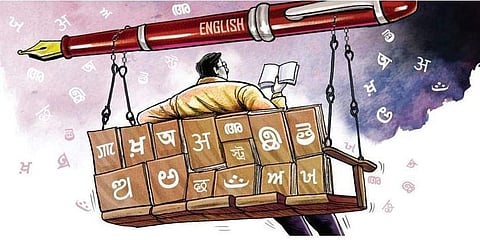
- LIFESTYLE
- FASHION
- FOOD
- ENTERTAINMENT
- EVENTS
- CULTURE
- VIDEOS
- WEB STORIES
- GALLERIES
- GADGETS
- CAR & BIKE
- SOCIETY
- TRAVEL
- NORTH EAST
- INDULGE CONNECT

Ask a translator why they chose their profession, and most of them will cite reasons like their love for languages and the ability to bring the world together as one. A few might even fondly describe their work as a puzzle — a continuous search for the right word that, once found, connects everything perfectly. This arduous act of love is what the United Nations celebrates yearly as International Translation Day on September 30. Not only is it a day to honour translation as a profession, it also brings awareness about the myriad languages that bind us together as a society.
An arduous labour
Even though translation means ‘carried into a new language’, it is more than just that from a littérateur’s point of view. Explaining this thought process, Dr. Ira Raja, a Delhi University professor, says, “The act of writing your dreams is also translation. It is a paradox where you translate while you recognise. The concept is not to fetishise the idea of authenticity, but to produce a work where the original has left its traces.” Therefore, a translator is like an artist who takes the essence of the original story only to reimagine a tale into existence.
However, to the outside world, these translators garner not just praise but, to a great extent, criticism. Even after all these years, the infamous phrase ‘lost in translation’ crops up quite frequently in conversations almost as if to question whether the essence of the original text is ever retained when translated. “When visiting Varanasi, we take a bottle of water from the river Tungabhadra and pour it in the river Ganga and when coming back we take a bottle of water from the Ganga to pour into the Tungabhadra. Since both places represent Lord Shiva, we do this so that the Ganga can taste the sweet water of the Tungabhadra and its holiness can be transferred into the Tungabhadra,” says Vasudhendra, author of the Kannada book The Unforgiving City and Other Stories, translated in English by Mysore Nataraja and published by Penguin Random House India. A native of Hampi, Karnataka, he believes that this transference of the two rivers’ waters perfectly resonate the intricate art of translating a literary work. For translated works, words are transferred such that it makes the two texts unique and one with each other at the same time.
Politics of power
For some time now, the world has been ready to go beyond Indian writing in English and discover the various languages this rich country has to offer. Indian literature is often discussed in academic circles around the world, but the diversity of literature in regional languages still remains invisible. Bringing that to global visibility is what translators around the country have been doing for ages. With such great responsibility, many from literary circles hint at a sort of power struggle and a sense of hubris attached to the process. However, when asked if he agrees, renowned translator Arunava Sinha, who translated Shameless by Taslima Nasreen (translated from Bengali to English) published by HarperCollins India, says, “The writer of the first version and the translator dance a tango, neither has more power than the other. The writer provides the material without which there can be no translation. And the translator provides the words without which there can be no translation. There is no power game here.”
Debunking the myth
If you think about it, it is very easy to identify a bad translation. It is akin to cutting an object with a scissor while drunk; it’s a book completely misinterpreted. To be able to successfully, and with conviction, bring someone else’s words, emotions as well as the soul of an entire language out into the world is no small feat.
Sinha mentions, “The truth is that a text is many things, offering a different possibility to every reader, rich with the scope for interpretation. Nor can it be reduced to an essence, to a single quality.”
It is therefore time to lose the phrase ‘lost in translation’. “A translation is another version of the same text. Nothing is lost or gained, it is a rendition,” Sinha concludes, encompassing the zeal the translators of the world exhume in bringing society one step closer, one book at a time.